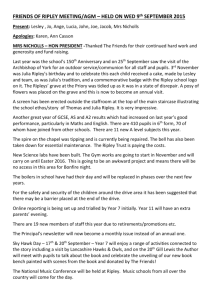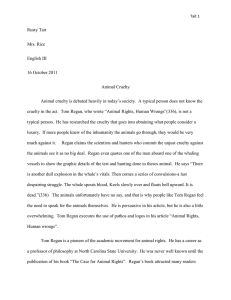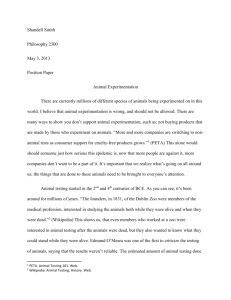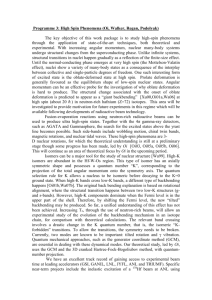Stephen Kimber (Author) Notes - Writers` Federation of Nova Scotia
advertisement
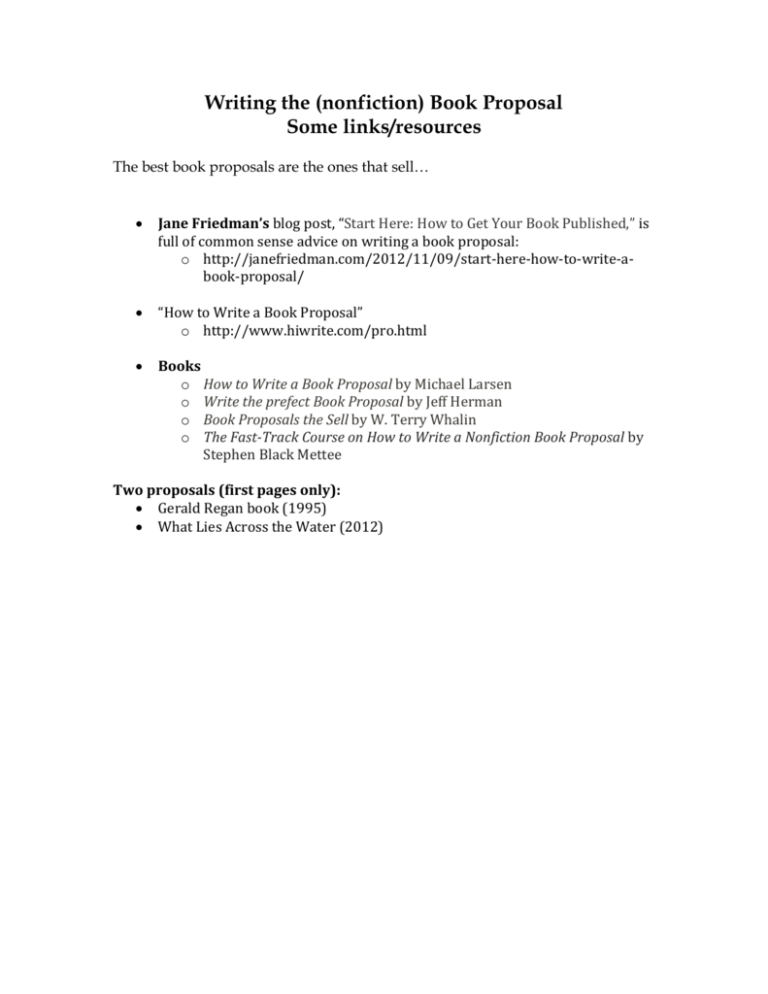
Writing the (nonfiction) Book Proposal Some links/resources The best book proposals are the ones that sell… Jane Friedman’s blog post, “Start Here: How to Get Your Book Published,” is full of common sense advice on writing a book proposal: o http://janefriedman.com/2012/11/09/start-here-how-to-write-abook-proposal/ “How to Write a Book Proposal” o http://www.hiwrite.com/pro.html Books o How to Write a Book Proposal by Michael Larsen o Write the prefect Book Proposal by Jeff Herman o Book Proposals the Sell by W. Terry Whalin o The Fast-Track Course on How to Write a Nonfiction Book Proposal by Stephen Black Mettee Two proposals (first pages only): Gerald Regan book (1995) What Lies Across the Water (2012) Stephen Kimber 2533 Beech Street Halifax, Nova Scotia B3L 2X9 Phone: (902) 425-6884/ Fax: (902) 429-6504 Email: skimber @ac.dal.ca APHRODISIAC sex, politics and gerald regan Introduction ............................................................................................... 1 The Market ................................................................................................. 3 Chapter-by-chapter outline ..................................................................... 4 “Believe it or not, it’s Ripley” ............................................................... 4 Interlude #1. Gerry and Me .................................................................. 4 “A lot of crust” ....................................................................................... 6 Days (and nights) in the land of the “dumbly horny” ..................... 7 “An open letter to the Honourable Gerald A. Regan, MP” ............. 9 “Abuse of process?” ............................................................................... 11 Interlude # 2. The Hockey Game ......................................................... 11 The Trial .................................................................................................. 12 The Verdict .............................................................................................. 12 Aftermath ................................................................................................ 12 About the Author ...................................................................................... 13 Stephen Kimber and the Regan case ................................................... 15 Some of the Dramatis Personae Gerald Regan, the Accused................................................................... 17 Donald Ripley, the Accuser .................................................................. 24 Susan Potts, the Prosecutor .................................................................. 27 George MacDonald, Defence lawyer .................................................. 31 Letter from JLK to Stephen Kimber, April 3, 1993 ............................... 35 Introduction On July 12, 1993, a one-time Nova Scotia Tory-bagman named Donald Ripley walked into the new Minas, N.S., detachment of the RCMP to file a formal complaint. Ripley had plenty of reasons of his own to complain. He’d recently been barred from working as a stockbroker because the Investment Dealers’ Association of Canada decided he’d leaked confidential personal financial information about a federal cabinet minister, and he was having no luck launching his planned new career as an independent investment advisor. But his complaint had nothing to do with any of that. Or indeed, to do with him personally. He wanted the mounties to look into allegations that Gerald Regan, a former premier, former federal cabinet minister and now an international trade consultant, had sexually assaulted a young legislative page girl 16 years earlier while he was still the premier. Ripley, a dyslexic, part-Micmac high school dropout who’d made himself into a successful stockbroker largely by force of will and personality, has long been a shadowy character on the Nova Scotia political scene. He began his political career as a fundraiser for the Liberals but, after a personal falling out with Gerald Regan during the 1970 provincial election campaign, switched allegiances and re-emerged as a passionately committed Conservative. During much of the Buchanan-Mulroney era, he was one of Nova Scotia’s most powerful backroom politicians, serving as a key member of a select group of Buchanan political advisors who doled out Tory patronage contracts and appointments in exchange for political contributions. But the leaked documents affair — which revolved around allegations Ripley had given confidential financial information about federal cabinet minister Stewart McInnis’ blind trust to Liberal MP Sheila Copps — marked the beginning of the end of his power in both the business and political worlds. Despite his denial of any wrongdoing, Ripley was fired from his job as regional vice president of one of the country's largest stockbroking firms, found guilty of professional misconduct and shunned by many former political friends. As a result, Ripley had become increasingly paranoid — he talked frequently about political conspiracies and hinted darkly that he knew the real stories behind everything from Richard Hatfield’s drug bust to the suspicious death of a former provincial Tory party president. And now, as he explained it to RCMP Sergeant Jerry Pretty, he wanted the mounties to look into complaints of sexual misconduct by a former premier of Nova Scotia. He didn’t know many details, he confessed, but he could give him the name of an investigative reporter in Toronto who did. Pretty knew very little of Gerald Regan’s term in office, even less about the man in front of him. He’d spent most of his RCMP career working narcotics. But he’d learned one important lesson on that seedy beat: never dismiss a tip out of hand simply because the informant has an ulterior motive. Pretty took down the particulars. Seventeen months later, on March 15, 1995, Gerald Regan, 67, was formally charged with 16 counts of rape, attempted rape, indecent assault and unlawful detention in connection with incidents that dated from his days as a young lawyer in his hometown of Windsor, N.S. to his defeat as premier in 1978. The investigation Ripley touched off eventually involved as many as five officers working full-time. They conducted more than 350 interviews all over North America. But the investigation wasn’t just exhaustive, it was also controversial. In October 1993, four months after Ripley’s complaint, Frank magazine reported that the mounties were looking into the decades-old allegations. And the RCMP, in an unusual move, issued a press release confirming the story. That touched off a media feeding frenzy culminating in a March 1994 documentary report on the CBC’s Fifth Estate which claimed that it had interviewed a dozen different women who all said they’d been on the receiving end of unwanted sexual advances from Regan. Some of them are now among those named in the RCMP’s charges against Regan. Perhaps not surprisingly, Regan and his defence team — led by highprofile Toronto criminal lawyer Eddie Greenspan — say the former premier is the victim of a politically motivated witch hunt. Outside the courtroom the day the charges were filed, Regan, flanked by his wife and two of his six grown children, declared not only his innocence but his contention that “I have no doubt whatsoever that I would not be facing charges from these ancient allegations if I had not been in public life.” But is that true? Or is it true, as others argue, that Regan’s behavior escaped sanction for so many years precisely because he was a powerful politician. Aphrodisiac: sex, politics and gerald regan will explore that question as it peels back the layers of a Nova Scotia establishment that is still as insular as it is powerful. While keeping its focus on the Regan case, the 75,000-word manuscript — like John Berendt’s recent best-selling Midnight In The Garden Of Good And Evil — will also offer readers a window into a fascinating social and political netherworld peopled with colorful characters: the lecherous former premier and his grudge-nursing nemesis, the born-again Christian political pamphleteer with a God-given mission to expose corruption, the Madam with the best political connections in town, the cocky, brilliant hired-gun lawyer with a reputation to uphold and many others. WHAT LIES ACROSS THE WATER HOTEL BOMBS AND DEAD BROTHERS, CUBAN AGENTS AND MIAMI TERRORISTS BY STEPHEN KIMBER A BOOK PROPOSAL Stephen Kimber 2542 Elm Street Halifax, NS CANADA B3L 2Y4 (902)422-6884 Email: SK19490825@gmail.ccom Table of Contents What Lies Across the Water 3 Marketing 5 Excerpts 9 Prologue 9 Shootdown: June 13, 1995–March 12, 1996 20 Havana hotel bombings 51 Sting: September 11, 1996–September 12, 1998 67 Chapter by Chapter Outline 75 About the Author 93 What Lies Across the Water Is the man who blows up an airplane and kills dozens of civilians a murderous terrorist… or a valiant freedom fighter? Is the man who tries to stop the bomber a threat to national security… or a hero of the people? It depends. What Lies Across the Water is a narrative nonfiction thriller. About terrorists who want to blow up airplanes and overthrow governments. And about intelligence agents assigned to prtend to be people they are not, slip into countries that are not theirs, infiltrate terrorist organizations, uncover plots and, if possible, prevent the plotters from succeeding. The twist is that these plotters are not Muslim; they’re Cuban exiles who see themselves as patriots trying to wrest their country back from a tyrant. And the men trying to stop them—intelligence agents of Cuban State Security—well, they see themselves as patriots too; trying to save their country, and countrymen, from being terrorized. What Lies Across the Water examines the post-9/11 Bush doctrine—“Any nation that continues to harbor or support terrorism will be regarded by the United States as a hostile regime”—through the particular, and peculiar lens of four decades of hostile Cuban-American relations. The narrative focuses on the 1990s, the decade following the collapse of the Soviet Empire, when the United States—and Miami’s Cuban exile community— had every reason to expect Fidel Castro’s communist regime to crumble too. When it didn’t, Miami’s militant exiles ratcheted up their attacks against the island; Cuba retaliated by sending their intelligence agents to South Florida to penetrate the plotters. What Lies Across the Water uses an in-the-moment narrative to tell the parallel, converging, diverging stories of the exile militants, Cuban spies and FBI agents as they joust in Havana, Miami and the Straits of Florida. The story moves from the streets of Little Havana to real Havana’s Tropicana nightclub, from the hotel bar at the Copacabana Hotel to the inner sanctum of the White House—and back. What Lies Across the Water climaxes when Cuba’s Miami spy network is arrested and the exiles who were plotting terrorist attacks on Cuba go free, which forces us to ask again: Who’s really a terrorist and who’s really a freedom fighter?
